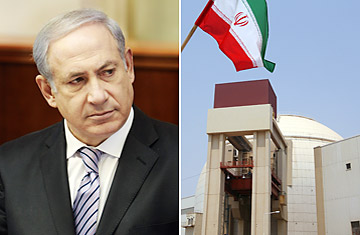
Israeli Prime Minister Benjamin Netanyahu; an Iranian nuclear power plant
The last time Israel's Prime Minister asked the U.S. to bomb the nuclear facilities of one of its enemies, he was rebuffed. "I cannot justify an attack on a sovereign nation unless my intelligence agencies stand up and say it's a weapons program," President George W. Bush says in his new memoir, Decision Points, that he told Ehud Olmert in response to the then Israeli Premier's request that he bomb a suspected nuclear reactor in Syria. And the CIA's assessment was that while the Syrian facility appeared to be a nuclear reactor under construction, it did not believe Damascus had a nuclear-weapons program. (Israel itself eventually bombed the facility.) Bush's rebuff of Olmert, however, hasn't deterred current Israeli Prime Minister Benjamin Netanyahu from making a similar request to President Barack Obama on Iran.
Netanyahu met Sunday with Vice President Joe Biden in New Orleans, and, according to the Israeli leader's aides, told Biden that the Obama Administration's sanctions effort is not going to change Iran's mind on the nuclear issue. "The only way to ensure that Iran will not go nuclear is to create a credible threat of military action against it if it doesn't cease its race for a nuclear weapon," Reuters reported one Netanyahu aide as telling Biden. "The economic sanctions are making it difficult for Iran, but there is no sign that the Ayatullah regime plans to stop its nuclear program because of them."
U.S. Defense Secretary Robert Gates responded Monday with a clear rebuke, saying "sanctions are biting more deeply than they anticipated" and that he "would disagree that only a credible military threat can get Iran to take the steps it needs to" on its nuclear program. The Israelis are not wrong in arguing there's no sign that Iran intends to change course despite the sanctions, and their skepticism of that reality changing in the future is widely shared by analysts. Still, the call for military action — because the "threat" of force can only be "credible" with a demonstrable readiness to follow through — continues to arouse skepticism in the U.S. military establishment, in which the consequences of starting a war with Iran are deemed potentially more dangerous than any threat currently posed by Iran's nuclear program. And, apropos the threshold for action as stated by President Bush on Olmert's Syria request, the U.S. intelligence community's assessment is that while Iran is using its nuclear-energy program to give itself the means to produce nuclear weapons, it has made no decision to actually build such weapons.
Secretary Gates, like President Obama, insisted that the threat of force remains on the proverbial table. But the Obama Administration would have neither a legal basis nor much international support beyond Israel for initiating a new war in the Middle East that could have disastrous consequences for regional security and for the world economy — and would probably strengthen the regime's hand at home and even its regional influence, which has grown steadily since the U.S. invasion of Iraq.
The Obama Administration and its allies are preparing to start a new round of negotiations with Iran, but the search for a diplomatic solution is bound to be protracted and its outcome is uncertain. So, the Israelis are clearly looking to turn up the pressure on Obama to prepare for war with Iran. And they could be helped by the outcome of last week's congressional election. Influential South Carolina Republican Senator Lindsey Graham on Saturday urged President Obama to go beyond sanctions and take "bold" action against Tehran, warning that "containment is off the table." (Containment refers to the idea that the U.S. and its allies ought to prepare a strategy, like that used against the Soviet Union, to limit the damage and the danger of a catastrophic war in a situation in which Iran succeeds in creating nuclear weapons.) Graham is just one of a number of GOP legislators pressing for confrontation with Iran. Should Tehran fail to back down, Graham advocates a U.S. military campaign "not just to neutralize their nuclear program, but to sink their navy, destroy their air force and deliver a decisive blow to the Revolutionary Guard. In other words, neuter that regime."
That could be dangerous rhetoric if it were taken seriously by Iran: after all, fear of regime change is the most important reason the intelligence community believes Tehran would have for seeking a nuclear deterrent. But Graham's comments were dismissed by Iran's Foreign Minister, Manouchehr Mottaki, as "a joke," and he advised reporters not to take them seriously. Nor is that simply bravado: Iranian analysts believe that the U.S., given its travails in Iraq and Afghanistan, is in no position to launch a new war against a far stronger foe.
There are some in Obama's Administration who share the view that a credible threat of force in the nuclear standoff is essential if the use of force is to be avoided. But there are also skeptics. And issuing a credible threat of force becomes a zero-sum game, because the Iranians are unlikely to negotiate under a threat of coercion — either they blink or call the U.S.'s bluff, leaving the Iranians to either retreat in humiliation or plunge into a dangerous war.
It's already plain to see that being "soft on Tehran" will be a key trope used by Republicans aiming to prevent President Obama's re-election in 2012, and any attempt at engagement of any sort with Iran will likely bring relentless attacks on Capitol Hill. That will certainly suit the Israeli leadership, who not only want to see a more confrontational U.S. position on Iran, but who also came into office insisting that Iran's nuclear program, rather than peace with the Palestinians, should be Washington's priority in the Middle East.
